Your skin reflects your inner health and well-being. Though skincare products play a role, true radiance starts from within. What you eat can directly impact how your skin looks and feels, making diet an essential part of your skincare routine.
Eating a variety of foods rich in antioxidants, like berries and leafy greens, helps protect your skin from damage caused by pollution and the sun. Healthy fats from sources like nuts, seeds, and avocados can improve skin elasticity and maintain its natural glow.
Vitamins and minerals such as vitamin C, E, and zinc are also important for skin repair and renewal. Staying hydrated with plenty of water and consuming water-rich foods like cucumbers and oranges supports soft, plump skin. In short, a well-balanced diet can be one of the most powerful tools for achieving healthy, glowing skin naturally. Let your meals nourish not just your body, but your skin too.
Why What You Eat Matters

Antioxidant Shield for Skin Defense: Each day, your skin faces harmful elements like ultraviolet rays, pollution, and emotional stress, all of which can produce damaging free radicals. These unstable molecules attack healthy skin cells, leading to early signs of aging such as fine lines, dark spots, and sagging. Consuming antioxidant-rich skin food—such as those containing vitamins A, C, and E, along with flavonoids and carotenoids—can help neutralize these free radicals and protect your skin’s youthful appearance.
Collagen Formation and Structural Integrity: Collagen acts as the main building block of the skin, giving it firmness, volume, and resilience. To promote collagen synthesis and maintain its integrity, your body needs essential nutrients like vitamin C, zinc, and amino acids. Incorporating collagen-supportive skin food into your diet helps maintain a smooth, plump, and youthful complexion over time.
Healthy Fats and Skin Moisture Retention: A steady intake of healthy fats—such as those found in avocados, nuts, seeds, olive oil, and fatty fish—strengthens the skin’s outer layer. These skin food sources support hydration by sealing in moisture, minimizing dryness, and calming skin irritation. They also help reduce inflammation, which contributes to clearer, calmer skin.
Inflammation Reduction and Skin Barrier Support: To soothe sensitive or reactive skin, nutrients like omega-3 fatty acids, zinc, and plant-based phytonutrients are essential. These skin food components help calm inflammation, minimize acne, and accelerate the healing of skin damage. A stronger barrier protects the skin from further harm and environmental triggers.
Gut Health and Clear Skin Relationship: The gut and skin are closely linked through the gut-skin axis. A diet rich in prebiotics and probiotics—such as yogurt, kefir, fermented vegetables, and fiber-rich foods—nourishes your gut microbiome. These skin food choices promote digestion, reduce internal inflammation, and support clearer, healthier skin from within.
Top Skin‑Friendly Foods & Their Key Benefits
Avocados
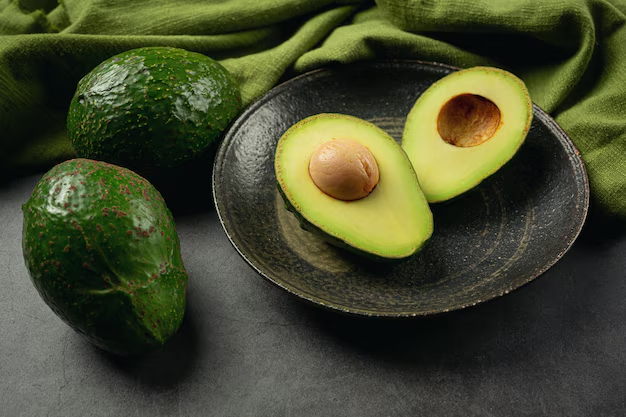
Avocados are a powerful skin food loaded with healthy fats, especially monounsaturated fats, which help keep the skin soft and moisturized. These natural fats strengthen the skin’s protective barrier, preventing dryness and flakiness. Regular consumption of avocados can give your skin a smooth and supple feel.
In addition to healthy fats, avocados are rich in vitamin E, a key antioxidant that protects the skin from damage caused by free radicals and UV rays. This vitamin also helps reduce inflammation and promotes healing, making it great for maintaining healthy, youthful-looking skin.
Avocados also contain vitamin C, which supports collagen production. Collagen is the protein responsible for keeping your skin firm and elastic. Including avocados in your meals not only adds flavor but also delivers essential skin food nutrients that support skin health from the inside out, promoting a naturally radiant glow.
Why: Packed with monounsaturated fats, vitamins C, E, biotin—moisturizes skin, protects from oxidation, and supports collagen synthesis.
Use It: Spread mashed avocado on toast topped with olive oil; blend into smoothies; mash with yogurt for a creamy face mask
Fatty Fish (Salmon, Mackerel, Sardines)
Fatty fish like salmon, mackerel, and sardines are excellent sources of omega-3 fatty acids, making them powerful skin food for maintaining a healthy complexion. These fats help keep skin moisturized, soft, and flexible while reducing inflammation that can lead to redness, acne, or irritation.
These fish are also rich in high-quality protein, which is essential for building and repairing skin tissue. They provide vitamin E, an antioxidant that protects the skin from damage caused by free radicals. The selenium found in fatty fish also supports skin elasticity and protects against sun damage.
In addition, fatty fish contain zinc, a mineral that plays a key role in controlling inflammation and supporting the production of new skin cells. Adding fatty fish to your diet a few times a week can nourish your body with essential skin food nutrients that promote clearer, calmer, and more hydrated skin.
Why: Rich in omega‑3s, protein, vitamin D—helps skin hydration, reduces inflammation, supports healing and elasticity.
Use It: Grill salmon with lemon and herbs; add sardines to grain bowls; try mackerel tacos.
Berries (Blueberries, Strawberries, Raspberries)
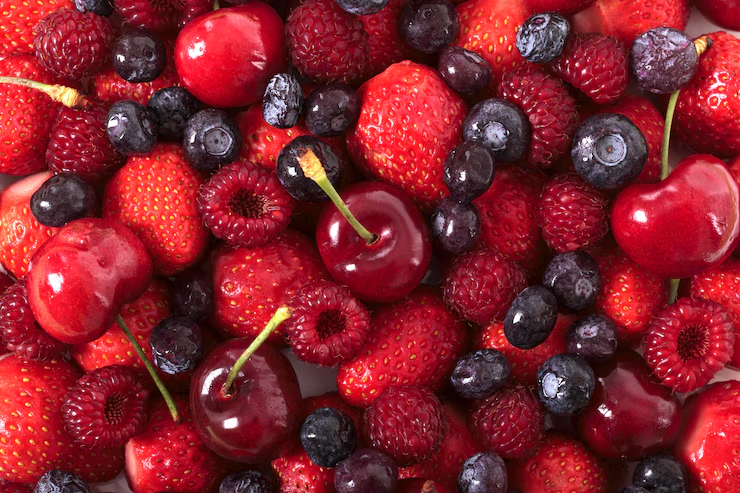
Berries like blueberries, strawberries, and raspberries are rich in antioxidants, making them a powerful skin food for protecting and repairing your skin. These antioxidants help fight free radicals—unstable molecules caused by sun exposure, pollution, and stress—that can damage skin cells and speed up aging.
In addition to antioxidants, berries are loaded with vitamin C, a key nutrient for collagen production. Collagen keeps your skin firm, smooth, and youthful. Eating berries regularly helps support the skin’s natural structure, reducing the appearance of fine lines and promoting elasticity.
Berries also have anti-inflammatory properties, which can help calm irritated skin and reduce puffiness or redness. Their high water content supports skin hydration from within. Including a variety of berries in your diet is a delicious and natural way to provide your skin with essential skin food that enhances glow and overall skin health.
Why: High in antioxidants (vitamin C, anthocyanins)—fight free radicals, boost collagen, prevent hyperpigmentation.
Use It: Add to oatmeal or yogurt; blend into smoothies; snack on frozen berries.
Nuts & Seeds (Walnuts, Almonds, Chia, Flax, Sunflower)
Nuts and seeds—like walnuts, almonds, chia, flax, and sunflower—are packed with essential nutrients that make them excellent skin food. They are rich in healthy fats, especially omega-3 and omega-6 fatty acids, which help keep the skin moisturized, soft, and supple. These fats also reduce dryness and inflammation.
Many of these nuts and seeds are high in vitamin E, a powerful antioxidant that protects the skin from free radical damage and supports a healthy glow. For example, almonds and sunflower seeds are especially good sources of this skin-loving vitamin. Flax and chia seeds also support skin cell repair due to their anti-inflammatory effects.
In addition, these nutrient-dense snacks provide zinc, selenium, and plant-based protein—all of which help with wound healing, collagen production, and protection from environmental stress. Adding a handful of these skin food options to your daily diet can greatly benefit your skin’s overall health.
Why: Provide vitamin E, omega‑3/6 fats, zinc, selenium—protects skin from inflammation and sun damage.
Use It: Sprinkle on salads or cereal; use nut butter on fruit; add chia/flax to smoothies or puddings.
Sweet Potatoes & Carrots
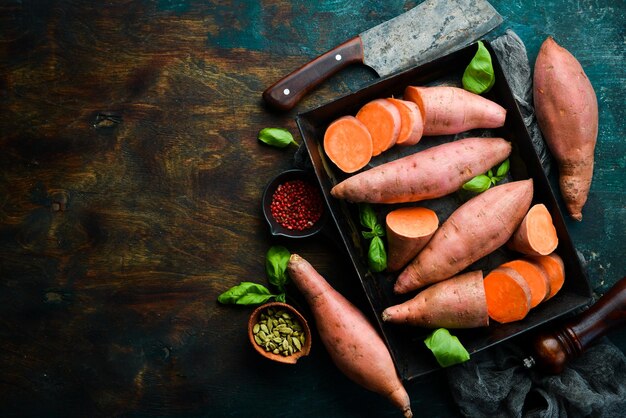
Sweet potatoes and carrots are powerful skin food because they are rich in beta-carotene, a plant-based compound that the body converts into vitamin A. This nutrient helps protect the skin from sun damage and keeps it smooth and healthy by supporting the renewal of skin cells.
Vitamin A plays a key role in maintaining the skin’s outer layer, preventing dryness, flakiness, and dullness. When you eat sweet potatoes or carrots regularly, your skin may develop a natural glow due to the antioxidant effect of beta-carotene, which also helps prevent signs of aging.
These vegetables are also rich in vitamin C, which supports collagen production for firm and elastic skin. Low in calories and high in nutrients, sweet potatoes and carrots are excellent additions to any meal. Including them in your diet provides essential skin food benefits that nourish and protect your skin from the inside out.
Why: Rich in beta‑carotene → vitamin A precursor—promotes cell turnover, protects from UV damage, gives a natural glow.
Use It: Roast sweet potato wedges; grate carrots into slaws or stews; blend into smoothies.
Red/Yellow Bell Peppers & Tomatoes
Red and yellow bell peppers, along with tomatoes, are vibrant vegetables that serve as excellent skin food. They are packed with vitamin C, which plays a vital role in collagen production. Collagen helps keep the skin firm, smooth, and youthful, reducing the appearance of fine lines and wrinkles.
These colorful vegetables are also rich in beta-carotene and lycopene—powerful antioxidants that protect the skin from sun damage and oxidative stress. Lycopene, especially found in tomatoes, may help improve skin texture and reduce redness caused by sun exposure.
In addition, the high water content in bell peppers and tomatoes helps keep the skin hydrated from within. Eating these vegetables regularly not only adds color and flavor to your meals but also supports healthy, glowing skin. Including them in your diet is an easy and natural way to give your body the skin food it needs for lasting skin health.
Why: Packed with vitamin C, beta‑carotene, lutein, lycopene—boost collagen, reduce sun damage, support skin elasticity.
Use It: Roast with olive oil; add fresh to salads; make gazpacho base.
Broccoli & Green Leafy Veggies
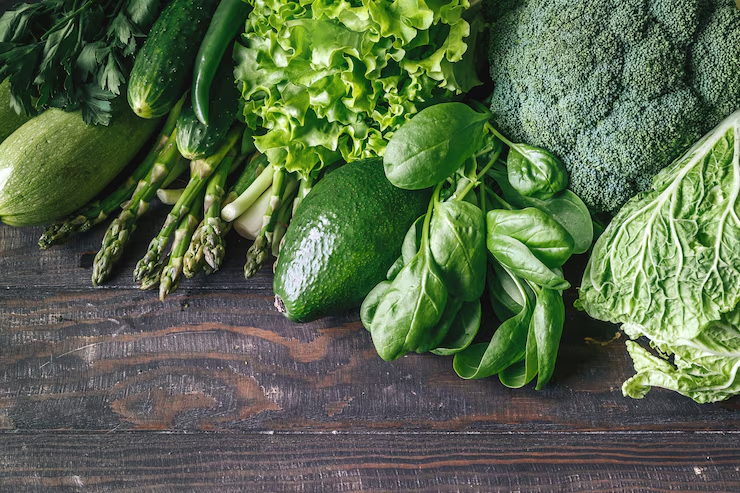
Broccoli and green leafy vegetables like spinach and kale are some of the most nutrient-dense skin food options available. They are rich in vitamins A, C, and K, all of which support skin health by promoting repair, reducing inflammation, and helping the skin stay clear and smooth.
These vegetables are loaded with antioxidants and phytonutrients that protect the skin from free radical damage caused by pollution and UV rays. Vitamin C helps with collagen production, while vitamin A supports the renewal of skin cells, preventing dryness and dullness.
Green leafy veggies also contain folate and fiber, which help cleanse the body and support a healthy gut—factors that indirectly boost skin clarity. Including broccoli and leafy greens in your diet regularly gives your body the essential skin food it needs to maintain a glowing, refreshed, and healthy appearance from the inside out.
Why: Full of vitamins A, C, K, folate, lutein, sulforaphane—antioxidant, anti-inflammatory, detoxifying benefits.
Use It: Steam or stir-fry as sides; blend spinach into soups or smoothies; raw kale salads with citrus dressing.
Fermented & Prebiotic Foods (Yogurt, Kefir, Kimchi, Garlic, Onions, Bananas)
Fermented and prebiotic foods like yogurt, kefir, kimchi, garlic, onions, and bananas are powerful skin food because they support a healthy gut microbiome. A balanced gut helps reduce inflammation throughout the body, which can lead to clearer, healthier skin.
Fermented foods contain probiotics—good bacteria that aid digestion and improve nutrient absorption. This can help your body get more of the vitamins and minerals it needs to nourish and repair the skin. Probiotics may also reduce skin issues like acne, redness, or sensitivity by calming internal inflammation.
Prebiotic foods like garlic, onions, and bananas feed the good bacteria in your gut, helping them thrive. A well-functioning gut supports detoxification and reduces toxins that may otherwise affect the skin. Including both fermented and prebiotic foods in your daily meals is a simple yet powerful way to fuel your body with skin food for a naturally radiant complexion.
Why: Prebiotics feed good gut bacteria; probiotics support a healthy microbiome → less inflammation, clearer skin.
Use It: Add kimchi to bowls; have kefir smoothies; sauté garlic/onions; snack on bananas or nuts.
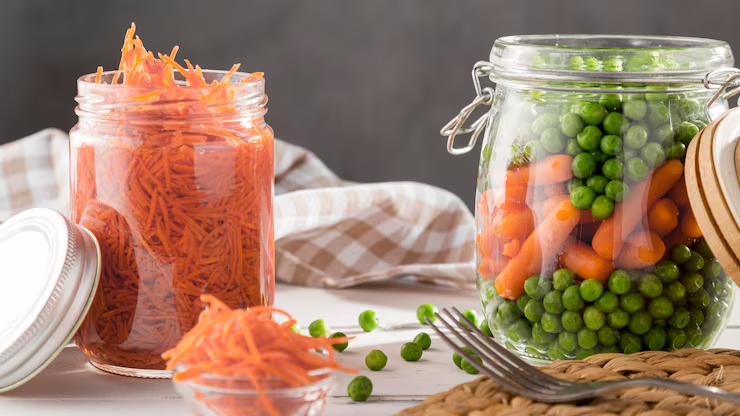
Papaya & Citrus Fruits (Oranges, Kiwi, Guava)
Papaya and citrus fruits like oranges, kiwi, and guava are excellent sources of vitamin C, making them powerful skin food for glowing, youthful skin. Vitamin C is essential for collagen production, which keeps the skin firm, smooth, and elastic, helping reduce fine lines and wrinkles.
Papaya is also rich in enzymes like papain, which helps gently exfoliate the skin from within, removing dead cells and supporting a clearer complexion. Meanwhile, citrus fruits offer antioxidants that protect the skin from free radical damage caused by sun exposure and pollution.
These fruits are also high in water content, which helps keep your skin hydrated and refreshed. Adding papaya and citrus fruits to your daily diet is a tasty and effective way to nourish your skin from the inside. Their natural nutrients work together to offer the skin food your body needs for healthy, radiant skin.
Why: High in vitamin C, papain enzyme—boosts collagen, brightens complexion, exfoliates dead skin.
Use It: Enjoy fresh for breakfast; make a tropical fruit salad; blend papaya into smoothie bowls.
Skin‑Boosting Daily Meal Plan
| Time | Meal |
|---|---|
| Breakfast | Smoothie with spinach, banana, berries, avocado, yogurt/kefir, chia/flax seeds |
| Green tea or matcha | |
| Mid‑Morning Snack | Handful of nuts (walnuts, almonds) and an orange or kiwi |
| Lunch | Mixed leafy greens salad (spinach, kale) with roasted sweet potatoes, bell peppers, |
| tomatoes, pumpkin seeds, avocado & olive oil-lemon dressing | |
| Grilled salmon or chickpea patties (plant-based option) | |
| Afternoon Snack | Dark chocolate square with papaya or watermelon cubes |
| Dinner | Baked mackerel or salmon with garlic-herb seasoning |
| Steamed broccoli and carrots drizzled with olive oil | |
| Side of kimchi or yogurt dip | |
| Evening | Herbal green tea |
| Papaya bowl or cucumber slices |
Lifestyle Tips for Glowing Skin
| Tip | Benefit |
|---|---|
| Hydrate (2‑3 L water/day) | Supports skin moisture and detoxification |
| Minimize UF sugars, processed foods, alcohol | Reduces inflammation and glycation |
| Consistency | Steady nutrient intake improves skin over months |
| Sun Protection | Nutrients like beta‑carotene, lycopene aid, but SPF is essential |
| Adequate Sleep & Stress Control | Lower cortisol supports skin regeneration |
| Exercise | Enhances circulation and nutrient delivery to skin |
Summary: A 12‑Step Daily Skin Food Action Plan
| Time/Category | Activity/Meal |
|---|---|
| Morning Hydration | Wake up with a glass of water; sip green tea |
| Breakfast | Antioxidant-rich smoothie or oatmeal with berries & chia |
| Mid-Morning Snack | Nuts with a vitamin-C rich fruit (e.g., orange or kiwi) |
| Lunch | Large vegetable salad with fatty fish or plant-based protein |
| Afternoon Snack | Dark chocolate square with hydrating fruit (e.g., watermelon or papaya) |
| Dinner | Omega‑3 rich fish, colorful steamed/roasted veggies, fermented side (e.g., kimchi) |
| Hydration | Drink water or herbal/fruit-infused drinks throughout the day |
| Sun Protection | Apply SPF and avoid sun exposure during peak hours |
| Sleep | Sleep 7–9 hours in a cool, dark room |
| Movement | Engage in daily physical activity to support circulation |
| Avoid | Limit processed foods, sugary drinks, and high alcohol intake |
| Consistency | Stick to the routine and enjoy naturally glowing skin |
Conclusion

Including skin food into your daily diet is one of the most effective and natural ways to achieve a radiant, youthful complexion. By focusing on nutrient-rich options like berries, fatty fish, avocados, nuts, and green leafy vegetables, you’re giving your skin the essential building blocks it needs to stay hydrated, firm, and resilient.
The benefits of skin food go beyond appearance—it also supports your body’s overall health, from reducing inflammation to improving gut balance and immunity. Unlike topical products, nourishing your skin from within leads to long-lasting results that reflect not only on your face but throughout your entire well-being.
Consistency is key. Make small but lasting changes by incorporating skin food choices into every meal. Over time, you’ll not only see improvements in your skin texture and glow but also feel more energized and balanced. Let your plate be your skincare routine—beautiful skin truly starts from within.
FAQs
- What is skin food ?
Skin food refers to nutrient-rich foods that promote healthy, glowing skin from the inside out. These include foods high in antioxidants, healthy fats, vitamins, and hydration-boosting properties. - How long does it take to see results from eating skin food ?
Visible skin improvements can appear within 3 to 8 weeks, depending on your overall diet, hydration, and consistency. Long-term benefits become more noticeable over several months. - Can skin food help with acne or skin conditions ?
Yes. Foods rich in omega-3s, zinc, and probiotics can reduce inflammation and support a healthy microbiome, which may help manage acne, eczema, and other skin issues. - Is it necessary to stop using skincare products if I eat skin food ?
No. Skin food complements your skincare routine. Combining a healthy diet with topical care enhances your skin’s appearance and resilience. - Are there specific skin foods for aging or dry skin ?
Absolutely. Fatty fish, avocados, nuts, and berries are excellent for aging and dry skin, thanks to their moisturizing and collagen-supporting properties.


